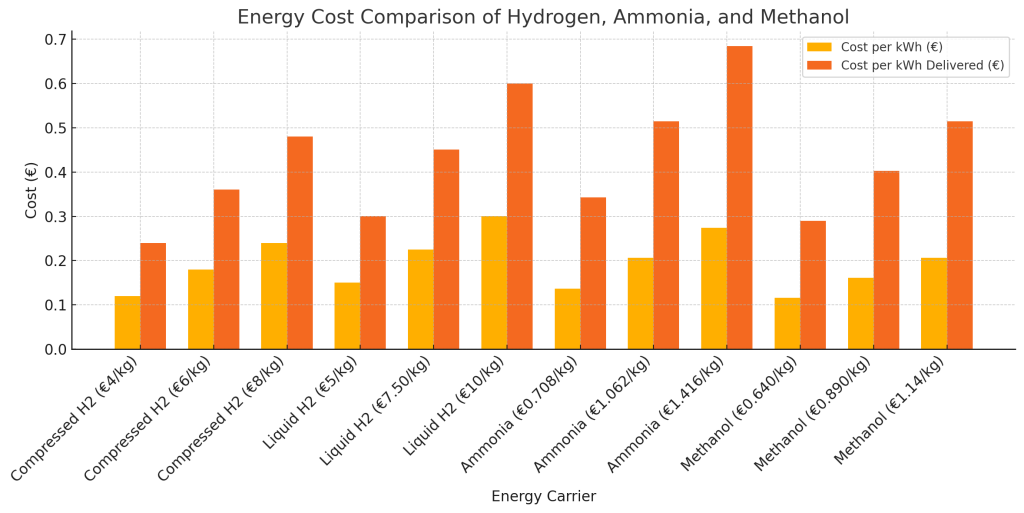The transition to a green energy economy requires careful consideration of energy carriers like hydrogen, ammonia, and green methanol. This deep-dive explores their energy efficiency and cost implications when derived from green hydrogen.
Hydrogen: The Baseline Energy Carrier
Hydrogen, with an impressive energy content of 33.3 kWh/kg (equivalent to 120 MJ/kg), is the most energy-dense of the three carriers. However, the cost per kWh varies significantly based on hydrogen prices and storage forms:
- Compressed Hydrogen:
- At €8 per kg, the cost per kWh is €0.2402, but with 50% fuel cell efficiency, the effective cost per kWh delivered is €0.4804.
- At €6 per kg, the cost per kWh drops to €0.1802, and at 50% efficiency, it results in €0.3604 per kWh delivered.
- At €4 per kg, the cost per kWh is €0.1201, and at 50% efficiency, it results in €0.2402 per kWh delivered.
- Liquid Hydrogen (25% higher cost due to liquefaction):
- At €8 per kg, the cost increases to €10.00 per kg, resulting in a cost per kWh of €0.3003, and €0.6006 per kWh delivered at 50% efficiency.
- At €6 per kg, the cost rises to €7.50 per kg, giving a cost per kWh of €0.2252, and €0.4504 per kWh delivered.
- At €4 per kg, the cost increases to €5.00 per kg, resulting in a cost per kWh of €0.1502, and €0.3004 per kWh delivered.
Hydrogen’s high energy density makes it a strong candidate for energy storage and transportation. However, compressed hydrogen is cheaper to produce and store, while liquid hydrogen, although more expensive, offers higher energy density per unit volume, making it suitable for specific applications like long-distance transport or aerospace.
Ammonia: A Versatile Option
Ammonia (NH₃), produced via the Haber-Bosch process, offers an energy content of 5.17 kWh/kg (equivalent to 18.6 MJ/kg). It requires 0.177 kg of hydrogen to produce 1 kg of ammonia. The process energy is ignored here. The cost of ammonia production is heavily dependent on hydrogen prices:
- At €8 per kg of hydrogen, the minimum ammonia production cost is €1.416 per kg, translating to €0.274/kWh, and at 40% combustion efficiency, the effective cost per kWh delivered is €0.685.
- At €6 per kg of hydrogen, the cost drops to €1.062 per kg, or €0.206/kWh, and at 40% efficiency, it results in €0.515 per kWh delivered.
- At €4 per kg of hydrogen, the cost decreases to €0.708 per kg, or €0.137/kWh, and at 40% efficiency, it results in €0.343 per kWh delivered.
While ammonia has a lower energy density, its ability to store hydrogen in a stable, liquid form and its existing infrastructure for global transport make it a practical option in specific applications.
Green Methanol: Balancing Cost and Utility
Green methanol (CH₃OH), produced from hydrogen and CO₂, has an energy content of 5.53 kWh/kg (equivalent to 19.9 MJ/kg). For every kilogram of methanol, 0.125 kg of hydrogen and 1.375 kg of CO₂ are required. The cost of methanol production is thus tied to both hydrogen and CO₂ prices:
- At €8 per kg of hydrogen and €100 per ton of CO₂, methanol costs €1.14 per kg, resulting in €0.206/kWh, and at 40% combustion efficiency, the effective cost per kWh delivered is €0.515.
- At €6 per kg of hydrogen and €100 per ton of CO₂, methanol costs €0.890 per kg, or €0.161/kWh, and at 40% efficiency, it results in €0.403 per kWh delivered.
- At €4 per kg of hydrogen and €100 per ton of CO₂, methanol costs €0.640 per kg, or €0.116/kWh, and at 40% efficiency, it results in €0.290 per kWh delivered.
The cost of CO₂ can vary significantly depending on the source, with captured CO₂ from industrial emissions or direct air capture influencing overall methanol pricing. Methanol offers a balance between energy density and cost-effectiveness. Its liquid form is easier to store and transport compared to hydrogen, and it can serve as a versatile fuel or chemical feedstock.
Energy Cost Comparison
Below graph summarized the cost of the fuels given the green hydrogen base price €4, 6 and 8 per kg respectively.

Key Takeaways
- Hydrogen remains the most energy-dense fuel, but cost and efficiency losses must be considered.
- Ammonia and Methanol offer cost advantages, with methanol providing an easier liquid fuel alternative.
- Lower hydrogen prices significantly impact total energy costs, making green alternatives increasingly competitive.